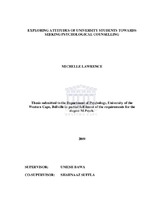| dc.description.abstract | Student counselling services, typically located within a holistic developmental approach, aim to render comprehensive student services to service users in relation to their psychological, social,educational and spiritual well-being. However, a number of cognitive and affective barriers reportedly reduce the likelihood of young people at universities seeking professional psychological help for personal-emotional problems. Accordingly, the aim of this study, which is located within the Theory of Reasoned Action, was to explore students’ attitudes towards utilising student counselling services, as well as their interpretations of the influence of age,
gender and education on their attitudes and self-rated knowledge regarding seeking
psychological help. The study thereby attempts to provide an understanding of the factors that influence help-seeking behaviours in university students. The research sample consisted of twenty nine students from the Cape Peninsula University of Technology. The data was collected through focus group discussions, which were conducted using an open-ended and participantcentred approach to the discussion. The qualitative approach of the study was informed by the theory of social phenomenology. Data gathered from the focus group discussions was thematically analysed. The results suggest that attitudes have a potentially important influence
on intentions to seek out psychological counselling. Findings show that students feel shame and guilt when they are struggling psychologically and as a result avoid seeking psychological intervention for fear of being negatively stigmatised. The study revealed that education around mental health disorders and the management thereof was crucial in order for them to be demystified and de-stigmatised, and to facilitate openness in the sharing of these problems, and society’s understanding and acceptance of people experiencing psychological disorders. Results also indicate that there is a shift taking place in these attitudes, and suggest ways in which this change can be further facilitated, such as the utilisation of peer helpers who could play a key role in facilitating and reinforcing help seeking behaviour. The outcomes of the study may further contribute to informing universities’ goal to provide accessible, quality and effective development and support services to its students. | en_US |

